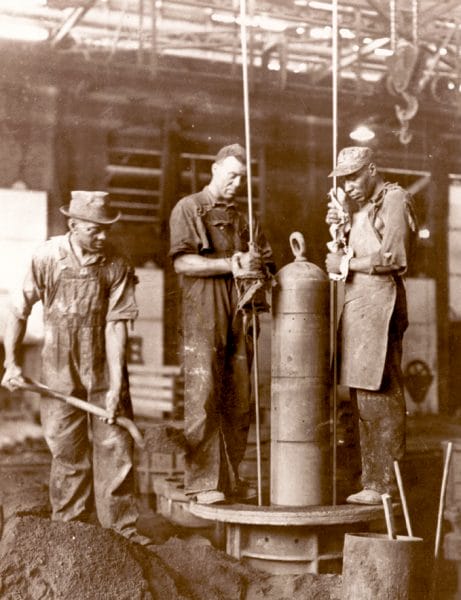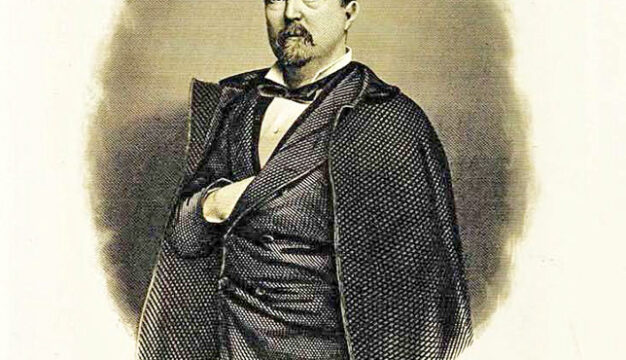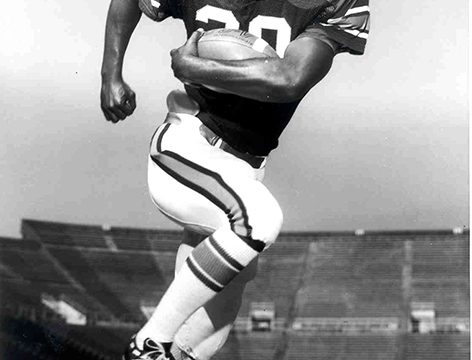Committee for Equal Job Opportunity
The Committee for Equal Job Opportunity (CEJO) was a labor and civil rights organization in Birmingham, Jefferson County, from the mid-1960s into the 1970s. Members of the CEJO were primarily Black industrial workers at Birmingham-based American Cast Iron Pipe Company (ACIPCO) who were protesting the company’s hiring and workplace discrimination against Blacks. Most notably, the organization fought for improved working conditions and restitution for lost wages in a prolonged but only partially successful class-action legal case using the Title VII employment protections of the 1964 Civil Rights Act.
The CEJO was officially created in March 1965, following informal off-site meetings of Black workers at ACIPCO and other Birmingham industrial manufacturers, including Stockham Valves and Fittings and U.S. Pipe, to discuss race-based mistreatment by employers. The workers expressed frustration at ACIPCO’s discriminatory hiring and workplace practices, including segregating facilities and limiting Black employees to the hardest and most dangerous jobs with no opportunity for promotion to managerial positions. Black workers were also excluded from membership in the Board of Operatives and the Board of Management, which acted jointly as trustees for the company. They were instead confined to positions on the Auxiliary Board, which ostensibly represented the Black workers yet lacked any voting ability or managerial influence. At the founding of CEJO, the industrial workers elected a committee of 12 ACIPCO workers to combat the racial discrimination in Birmingham’s industries. CEJO’s first chairman was Peter Wrenn who had worked for the company for more than 15 years and had previously been elected chair of the Auxiliary Board.
On May 13, 1966, CEJO filed a class action lawsuit against ACIPCO on behalf of members Rush Pettway, Alex Fitts, Davis Jordan, and Wrenn. This lawsuit was approved by the Equal Employment Opportunity Commission (EEOC), which was the federal agency created by the Civil Rights Act of 1964 to investigate and prosecute violations of the Title VII civil rights laws outlawing employment discrimination based on race, color, religion, sex, and national origin. Civil rights organizations such as CEJO invoked the new laws to apply pressure against the racial hierarchy enforced within Birmingham’s economic structure. The CEJO lawsuit accused ACIPCO of being organized with the explicit purpose of discrimination and to limit the opportunities of its Black workers. CEJO was represented by civil rights attorneys Oscar W. Adams Jr. and U. W. Clemon. The pair would become the first Black man appointed to the Alabama Supreme Court and the state’s first Black federal judge, respectively.
Federal judge Seybourn Lynne of the U.S. District Court for the Northern District of Alabama initially dismissed the case in 1967 before having heard any evidence. Lynne, who maintained a poor reputation among civil rights activists, claimed the EEOC did not make any attempts to reach an out-of-court settlement, so the federal agency had no right to sue. In September 1967, ACIPCO fired Wrenn, who appealed the firing contending it was in retaliation for his leadership in CEJO. Lynne ruled against Wrenn’s complaint, but this ruling was overturned by the Fifth Circuit Court of Appeals, which ordered Wrenn reinstated with back pay. The Fifth Circuit also reversed Lynne’s ruling in the CEJO class action lawsuit and reinstated the case in 1970.
In 1970, hearings commenced for Pettway v. American Cast Iron Pipe Company, which became a multiyear legal process involving rulings, overrulings, and appeals. In 1971, the district court ruled that the company had implemented a discriminatory hiring system that severely hampered the employment opportunities of Black workers. Following the Civil Rights Act of 1964, ACIPCO required testing for hiring and promotions. While this testing allowed the company to claim merit-based opportunities, the tests were used to deny promotions for Black workers. Also, the company-run classes to improve test scores were racially segregated, procedures which the U.S. Supreme Court declared unconstitutional in 1971. Despite these rulings, Lynne denied the request for back pay. The Fifth Circuit once again reversed Lynne’s decision, instructing the court to direct settlement negotiations for back pay to the CEJO-represented workers. Although CEJO sued for $11 million, on June 12, 1975, Lynne ordered ACIPCO’s settlement decreased to $1 million to be paid to 841 of the 2,241 ACIPCO workers represented by CEJO. (The 1,400 who were not rewarded any back pay by Lynne’s ruling had been hired by ACIPCO after July 2, 1965.) CEJO spokesman Harvey Henry referred to Lynne’s order as an example of the court only doing the minimum to appear racially unbiased and the organization encouraged its members to refuse to cash the checks. Lynne set a deadline of December 15, 1975, for ACIPCO workers to cash their settlement checks, which further outraged CEJO leadership. When Oscar Adams, Jr., informed his clients that he would not appeal the ruling, the CEJO replaced Adams with Robert L. Wiggins Jr., a 1974 graduate of the University of Alabama School of Law, to file an appeal and the case continued into the 1980s. Despite the prolonged litigation of Pettway v. ACIPCO, the back pay never increased beyond the initially settled $1 million. Further class-action lawsuits charging ACIPCO with both race and sex discrimination were litigated into the twenty-first century.
Beyond representing ACIPCO employees in the courts, CEJO encouraged wide participation as witnesses to the proceedings during the cases, and Black workers arrived at the courthouse en masse. The organization led protests both at the workplace and in public spaces, and ACIPCO employees organized lunchroom sit-ins protesting the company’s segregated facilities. The organization also organized demonstration marches against discrimination that raised public awareness of the ongoing litigation while connecting their case with the larger Black freedom struggle. On June 30, 1972, CEJO, in unison with the Alabama Economic Action Committee (AEAC), another activist organization led by Birmingham-area Rev. Robert McKinney, marched from Birmingham’s Sixteenth Street Baptist Church to the Federal Building and Courthouse (present-day Robert S. Vance Federal Building and United States Courthouse) and the Jefferson County Courthouse to protest both job discrimination and police brutality. The CEJO also expressed disillusionment with the EEOC by picketing outside its offices. On November 25, 1975, CEJO ran a motorcade protest through downtown Birmingham from the Sixteenth Street Baptist Church to ACIPCO. These protests expanded beyond ACIPCO to include workers at U.S. Steel and U.S. Pipe and at employers outside of the industrial sector. Although CEJO became dormant by the late 1970s, the organization influenced multiple new Birmingham-based civil rights organizations operating as a coalition to pursue common goals, including economic justice. The use of Title VII protections in employment discrimination suits proved an important tool for combating workplace racism.
Further Reading
- Huntley, Horace, and John W. McKerley, eds. Foot Soldiers for Democracy: The Men, Women, and Children of the Birmingham Civil Rights Movement. Champagne-Urbana: University of Illinois Press, 2009.
- Widell Jr., Robert W. Birmingham and the Long Black Freedom Struggle. New York: Palgrave Macmillan, 2013.







